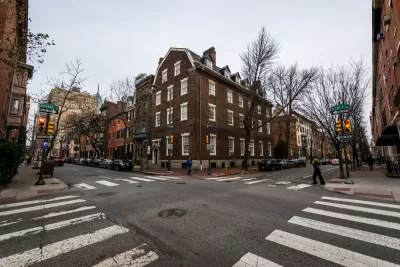One of the wealthiest neighborhoods in Philadelphia is increasing parking requirements and limiting building heights at all costs.

"Mayor Jim Kenney’s first direct veto of City Council legislation — over a bill establishing more restrictive zoning rules for the Society Hill neighborhood — has been reversed by the chamber," Ryan Briggs.
The veto override is the latest in a saga that has changed the fortunes of the downzoning on several occasions. First the Philadelphia City Council approved the rezoning over the objections of planning staff and the city's planning commission. Then Mayor Kenney vetoed the City Council's approval. Now the City Council has overridden that veto.
The Philadelphia City Council's commitment to the downzoning comes despite direct criticism of the exclusionary nature of the changes, and how that approach fits into the contemporary approach to planning in the city (i.e., it doesn’t).
The legislation will "cap the height of development along Walnut Street to just 65 feet, increase parking requirements and eliminate density bonuses granted in exchange for historic preservation," explains Briggs. "The bill would also limit building heights to 45 feet in some areas of the district spanning from Walnut to Lombard Street between 8th and the Delaware River."
The vote did reveal at least some dissent among the council, in a departure from the usual councilmanic prerogative that offers councilmembers control over land use questions in their districts. Four councilmembers voted against the override. The original legislation to implement the rezoning passed the council unanimously. Soundbites included in the article from some of the dissenting councilmembers explain the shift.
FULL STORY: Mayor Kenney’s first 2020 veto reversed in win for Society Hill Civic

Planetizen Federal Action Tracker
A weekly monitor of how Trump’s orders and actions are impacting planners and planning in America.

Map: Where Senate Republicans Want to Sell Your Public Lands
For public land advocates, the Senate Republicans’ proposal to sell millions of acres of public land in the West is “the biggest fight of their careers.”

Restaurant Patios Were a Pandemic Win — Why Were They so Hard to Keep?
Social distancing requirements and changes in travel patterns prompted cities to pilot new uses for street and sidewalk space. Then it got complicated.

Platform Pilsner: Vancouver Transit Agency Releases... a Beer?
TransLink will receive a portion of every sale of the four-pack.

Toronto Weighs Cheaper Transit, Parking Hikes for Major Events
Special event rates would take effect during large festivals, sports games and concerts to ‘discourage driving, manage congestion and free up space for transit.”

Berlin to Consider Car-Free Zone Larger Than Manhattan
The area bound by the 22-mile Ringbahn would still allow 12 uses of a private automobile per year per person, and several other exemptions.
Urban Design for Planners 1: Software Tools
This six-course series explores essential urban design concepts using open source software and equips planners with the tools they need to participate fully in the urban design process.
Planning for Universal Design
Learn the tools for implementing Universal Design in planning regulations.
Heyer Gruel & Associates PA
JM Goldson LLC
Custer County Colorado
City of Camden Redevelopment Agency
City of Astoria
Transportation Research & Education Center (TREC) at Portland State University
Camden Redevelopment Agency
City of Claremont
Municipality of Princeton (NJ)



























